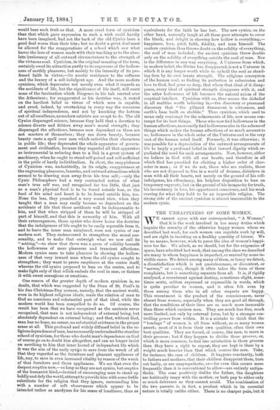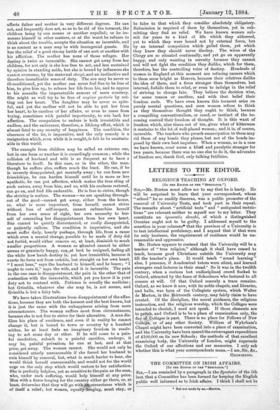THE UNHAPPINESS OF SOME WOMEN.
NvE cannot agree with our correspondent, " A Woman," that it is the work involved in too many duties which impairs the serenity of the otherwise happy women whom we described last week, for such women can regulate work by will, and are right in insisting on a healthy quantity of leisure. We by no means, however, wish to press the idea of women's happi- ness too far. We admit, as we should, but for the exigencies of space, have admitted last week, that among the class we described are many in whom happiness is imperfect, or marred by some in- visible cause. We detect among many of them, or fancy we detect, a dissatisfaction which is not querulousness, or discontent, or "nerves," or ennui, though it often takes the form of those complaints, but is something separate from all. It is, if rigidly analysed, a resentment against destiny, sometimes slight, some- times acute, seldom expressed or expressible in words, which is quite peculiar to women, and is often felt even by those among them who in all other respects are happy. This resentment is the product of the consciousness, never absent from women, especially when they are good all through, that the conditions of their lives are so much more inexorable than those which environ men. They are much less free, much more limited, not only by external force, but by a stronger con- trolling power from within. It is a mistake to think that the "bondage " of women is all from without, as so many women assert; most of it is from their own qualities, often their own best qualities. They are forced, of course, like men, to move in their grooves ; but if they happen to dislike those grooves, or, which is more common, to find less satisfaction in those grooves than they have a right to expect, they are kept in them by a weight much heavier than that which coerces the men. Take, for instance, the case of children. It happens constantly, both to fathers and mothers, that their children disappoint them, turn out badly, or are unsympathetic, or—for even this occurs more frequently than it is conventional to allow—are entirely antipa- thetic. The sons positively dislike the father, the daughters are habitually raspy with the mother, or both pay to either only so much deference as they-cannot avoid. The combination of the two parents is, in fact, a product which in its essential nature is totally unlike either. There is no sharper pain, but it
affects father and mother in very different degrees. He can act, and frequently does act, so as to be rid of the torment, the children being by one means or another expelled ; or he im- merses himself in other matters, or at the worst be refuses to think about the trouble, accepts the situation as incurable, and is as content as a man may be with incongenial guests. He has the relief of a good strong battle of one sort or another with his affliction. The mother has none of those refuges. Her destiny is twice as inexorable. She cannot get away from her children, for not only is she less free to act, and less sustained by opinion in standing aside, but she is bound by influences she cannot overcome, by the maternal storge, and an instinctive and therefore ineradicable sense of duty. The son may be never so ill-conditioned, yet the mother can never feel free to be free of him, to give him up, to release her life from his, and to oppose to his assaults the impenetrable armour of mere courtesy. She might as well try to be free of angina pectoris by cut- ting out her heart. The daughter may be never so spite- ful, and yet the mother will not be able to pat her from her heart, to be careless of her affairs, or even to cease from trying, sometimes with painful importunity, to win back her affection. The compulsion to endure is both irresistible and endless, and the endurance, therefore, a lifelong effort, which is almost fatal to any serenity of happiness. The condition, the closeness of the tie, is imperative, and the only remedy is a resignation which, even while it is sought, is felt to be unattain- able in this world.
The example from children may be called an extreme one, but in one form or another it is exceedingly common ; while the collision of husband and wife is so frequent as to have a literature to itself. In this case, as in the other, the man, though be suffers also, suffers much the least. He can, if he is severely disappointed, get mentally away ; he can form new friendships, he can harden himself until he is more or less apathetic. be can put affection, which makes the true sting of such unions, away from him, and so, with his coolness restored, can go on, and find life endurable. He is free to strive, though the striving is useless. The woman—we are speaking through- out of the good—cannot get away, either from the house, or, what is more important, from herself, cannot strive without loss of self-respect, cannot enfranchise herself from her own sense of right, her own necessity to her- self of concealing her disappointment from her own heart. She cannot be quietly discontented, or coolly disappointed, or patiently callous. The condition is imperative, and she must suffer daily, hourly perhaps, through life, from a cause which even a mental change, possible to be made if duty did not forbid, would either remove or, at least, diminish to much smaller proportions. A woman so aitnated cannot be either serene or genuinely happy, carat best be resigned, feeling all the while how harsh destiny is, yet how irresistible, because it exerts its force not from outside, but straight on her own heart. "I must bear," says the husband to himself, and he bears ; "I ought to cure it," says the wife, and it is incurable. The pain in the one case is disappointment, the pain in the other that of contention with the inexorable, which yet you know it is your duty not to contend with. Patience is usually the medicine ; but Griselda, whatever else she may be, is not serene, and Griselda is but a fairy tale.
We have taken illustrations from disappointment of the affec- tions, because they are both the keenest and the best known, but it is just the same with the unhappiness arising from mere circumstances. The woman suffers most from circumstances, because she is not free to strive for their alteration. A man dis- likes his place of residence, and even if in reality he cannot change it, but is bound to town or country by a hundred withes, he at least feels an imaginary freedom in resolv- ing to act some day or other. If he will come to a pain- ful resolution, submit to a painful sacrifice, undergo, it may be, painful privation, he can at last, and at that price, get away. The woman cannot. She would not only be considered utterly unreasonable if she forced her husband to ruin himself by removal, but, what is much harder to bear, she would think herself unreasonable, and would not for the world urge on the only step which would restore to her satisfaction. She is perfectly helpless, yet as sensitive to the.pain as the man, who, under such suffering, would help himself at any price. Men with a fierce longing for the country either go there, or, at least, determine that they will go with aft earnestness which is of itself a relief; but women, equally longing, must stay, or
be false to that which they consider absolutely obligatory. Submission is required of them by themselves, yet in sub- mitting they find no relief. We have known women sub- mit for years to a kind of life which they abhorred, yet to which they were bound not by external force, but by an internal compulsion which galled them, yet which they knew they should never disobey. The wives of the Clergy are so situated continually, and yet go on apparently happy, and only wanting in serenity because they cannot and will not fight the condition they dislike, which for them, therefore, has the controlling voice of destiny. Hundreds of women in England at this moment are refusing careers which to them seem bright as Heaven, because their relatives dislike the idea of them, and a force stronger than themselves, but internal, forbids them to rebel, or even to indulge in the relief of striving to change fate. They believe the decision wise, for some reason or another, and with that belief their freedom ends. We have even known this torment arise on purely mental questions, and seen women refuse to think as they themselves thought they ought to think, because a compelling conventionalism, or creed, or instinct of the be- coming coerced their freedom of thought. It is this want of freedom which, nine times out of ten, gives what of bitterness it contains to the lot of well-placed women ; and it is, of course, incurable. The teachers who preach emancipation to them may rid them of any bonds they please, but not of the bonds im- posed by their own best impulses. When a woman, as in a case we have known, must nurse a blind and paralytic stranger for two years, because there was no one else to do it, the advocates of freedom are, thank God, only talking futilities.







































 Previous page
Previous page